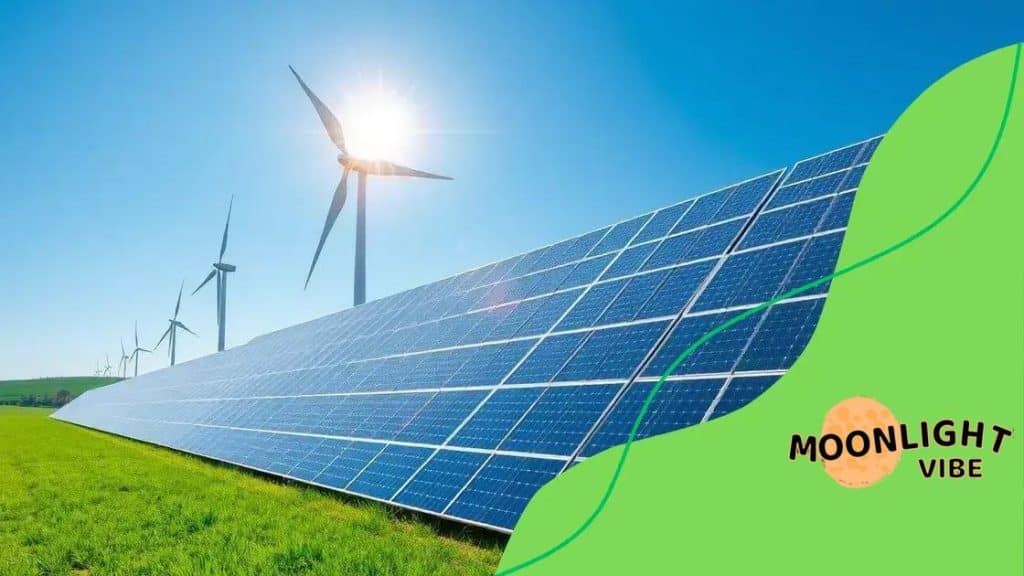Advances in renewable energy tech and their economic impact

Anúncios
Advances in renewable energy technologies significantly impact the economy by creating jobs, reducing energy costs, and fostering community sustainability through successful projects in solar, wind, and biomass energy.
Advances in renewable energy tech are reshaping our economy in remarkable ways. Have you ever wondered how these innovations can affect daily life and business? Let’s dive into this transformative world.
Anúncios
Overview of renewable energy technologies
Renewable energy technologies have changed the way we generate power and think about our resources. Understanding these innovations is important for everyone. They not only help the environment but also drive economic growth.
Popular Renewable Energy Technologies
There are several key technologies making waves in the renewable sector:
- Solar Power: Using panels to convert sunlight into electricity.
- Wind Power: Harnessing wind energy through turbines to generate power.
- Hydropower: Utilizing water flow in rivers and dams for energy generation.
- Biomass Energy: Converting organic materials into fuel.
Each of these technologies has unique benefits and challenges. For example, solar and wind energy are becoming cheaper and more efficient each year. This trend helps more homeowners and businesses switch to clean energy sources.
Anúncios
The adoption of these technologies not only reduces carbon emissions but also creates jobs in new industries. As more investments flow into the renewable energy sector, we can expect further advancements and innovations.
Advantages of Renewable Energy
Using renewable energy comes with numerous advantages:
- Lower Energy Costs: Over time, renewable energy can lead to savings on energy bills.
- Energy Independence: Countries can rely less on fossil fuel imports.
- Job Creation: More projects lead to new job opportunities in construction, maintenance, and technology.
- Environmental Benefits: Reduced pollution improves public health and preserves ecosystems.
As we look toward the future, understanding these technologies becomes crucial. With so much potential, renewable energy is not just a trend; it’s the way forward into a sustainable future. Embracing these advancements will enable us to create a cleaner, healthier planet for generations to come.
Economic benefits of renewable energy
The economic benefits of renewable energy are becoming clearer as technology advances. Many people are starting to see how these energy sources can boost the economy and create new jobs.
Job Creation through Renewables
One of the most significant advantages of renewable energy is its potential to create jobs. As the industry expands, more positions are needed in various sectors:
- Manufacturing: Producing solar panels and wind turbines requires skilled labor.
- Installation: Installing renewable energy systems creates jobs locally.
- Maintenance: Ongoing maintenance of energy systems is essential and provides jobs.
- Research and Development: Innovators and engineers are always needed for new technologies.
These opportunities not only support families but also contribute to local and national economies.
Cost Savings for Consumers
Another key benefit is the long-term cost savings for consumers. Although the initial investment in renewable energy systems can be higher, the ongoing expenses often decrease dramatically. Renewable energy sources like solar and wind typically have lower operational costs compared to fossil fuels.
Furthermore, as the technology improves and more companies enter the market, prices continue to drop. This makes renewable energy an attractive option for homeowners and businesses looking to reduce energy bills.
Energy Independence
By investing in renewable energy, countries can become less dependent on imported fuels. This energy independence allows nations to stabilize their energy prices. Additionally, it reduces the risks associated with global market fluctuations.
Each of these benefits leads to a stronger and more resilient economy. As consumers embrace renewable energy, it not only supports their financial well-being but also contributes to a sustainable future.
Challenges in the adoption of renewable technologies

While the shift to renewable technologies offers many benefits, several challenges can slow down this adoption. Understanding these obstacles is crucial for overcoming them.
High Initial Costs
One of the most significant barriers is the initial investment cost. Many renewable energy systems, like solar panels and wind turbines, require substantial upfront capital. Although prices have decreased over time, the initial investment can still be a hurdle for both individuals and businesses.
To help mitigate this challenge, various financing options are available:
- Loans: Many banks offer loans specifically for renewable energy systems.
- Incentives: Government incentives can help reduce upfront costs.
- Leasing: Some companies allow consumers to lease equipment instead of purchasing it outright.
Intermittency Issues
Another challenge is the intermittent nature of renewable sources like solar and wind. These energy sources depend on weather conditions, which can lead to energy supply fluctuations. This inconsistency makes it difficult to rely solely on renewables without proper energy storage solutions.
To address this issue, advances in battery technology are essential. Improved storage solutions allow energy generated during peak times to be used when production is low. Thus, having effective storage systems can enhance the reliability of renewable energy sources.
Regulatory and Policy Barriers
Government regulations and policies can also impact the adoption of renewable technologies. Some areas may have outdated laws that favor traditional energy sources over renewable options. Harmonizing regulations is vital to promote the transition to cleaner energy.
Additionally, integrating renewable energy into existing grid systems requires coordination and investment. Stakeholders must collaborate to develop policies that support renewable energy growth while ensuring grid reliability.
Public Awareness and Acceptance
Lastly, public awareness plays a significant role in adoption. Many people may not fully understand the benefits of renewable technologies. Improving education and outreach can help shift public perception and increase acceptance.
Promoting success stories and demonstrating the long-term advantages of renewable energy can inspire more individuals and businesses to make the switch.
Future trends in renewable energy innovations
The future of renewable energy innovations is bright and full of potential. As technology continues to evolve, several trends are shaping the landscape of renewable energy.
Advancements in Energy Storage
One significant area of development is in energy storage technologies. Improved battery systems are becoming more efficient and affordable. These advancements will allow for better capture and storage of energy produced from sources like solar and wind.
Some key improvements include:
- Longer Lifespan: New batteries are being designed to last longer and require less frequent replacement.
- Higher Capacity: Innovations in battery technology allow for storing more energy in a smaller space.
- Faster Charging: Improved chemical processes enable quicker charging times.
These enhancements will help balance supply and demand, making renewable energy more reliable.
Integration of Smart Technologies
Another trend is the integration of smart technologies. Smart grids and appliances can optimize energy use by automatically adjusting according to demand. This intelligent management helps reduce waste and lower costs for consumers.
By using sensors and data analytics, homes can become more energy-efficient. For example, smart thermostats can learn preferences and adjust heating and cooling accordingly.
Decentralized Energy Systems
Decentralized energy systems are also gaining popularity. Instead of relying solely on large power plants, communities can generate their own energy through local renewable sources.
This shift provides several benefits:
- Increased Resilience: Local systems can maintain energy supply during outages.
- Reduced Transmission Losses: Generating energy close to where it’s used cuts down on transmission losses.
- Community Empowerment: Local involvement encourages sustainable practices.
Emerging Renewable Technologies
Lastly, we can expect to see the emergence of new renewable technologies. Innovations in bioenergy, tidal energy, and even hydrogen fuel are on the rise. These alternatives provide diverse options for clean energy generation.
As societies become more environmentally conscious, the demand for sustainable solutions will drive further innovations. Embracing these trends will play a crucial role in achieving a greener future.
Case studies: success stories in renewable energy
Case studies provide excellent examples of how renewable energy can transform communities and economies. These success stories highlight the effectiveness of adopting renewable technologies.
1. The Solar City Initiative
In a thriving city, a large-scale solar initiative was launched to power local schools and government buildings. This project significantly reduced energy costs and carbon emissions.
Key outcomes included:
- 30% Reduction: Energy bills dropped by 30% within the first year.
- Community Involvement: Local residents participated in workshops to learn about solar energy.
- Job Creation: The initiative generated numerous jobs in installation and maintenance.
2. Wind Farm Success in the Midwest
Another shining example comes from a wind farm developed in the Midwest. This project utilized vast open lands to capture wind energy efficiently.
The impact on the region was remarkable:
- Economic Boost: Local economies benefited from increased revenue and taxes.
- Clean Energy Production: The wind farm produces enough energy to power over 50,000 homes.
- Environmental Benefits: The initiative significantly decreased reliance on fossil fuels.
3. Community Biomass Projects
In rural areas, several communities have come together to create biomass projects. These initiatives turn organic waste into energy, promoting sustainability.
Benefits of these projects include:
- Waste Reduction: Communities see a decrease in landfill waste.
- Energy Independence: Locally-produced energy reduces dependence on outside sources.
- Educational Opportunities: Schools incorporate biomass learning programs, teaching students about renewable energy.
These case studies illustrate that renewable energy technologies can lead to significant advancements in sustainability while providing economic and social benefits. By examining successful initiatives, other regions can be inspired to adopt similar green solutions.
In summary, the transition to renewable energy technologies brings substantial benefits that extend beyond environmental impact. Increased job opportunities, lower energy costs, and enhanced energy independence contribute positively to local and global economies. As seen in successful case studies, communities are thriving through innovations in solar, wind, and biomass projects. Overcoming challenges such as initial costs and regulatory barriers will pave the way for a sustainable future. By embracing the trends in renewable energy, we can build a cleaner, healthier planet for generations to come.
FAQ – Frequently Asked Questions about Renewable Energy
What are the main benefits of renewable energy?
Renewable energy offers numerous benefits, including lower energy costs, job creation, and reduced carbon emissions, leading to a cleaner environment.
How do community efforts impact renewable energy adoption?
Community efforts, such as local solar initiatives or biomass projects, empower residents and enhance sustainability, showing effective ways to leverage renewable energy.
What challenges do renewable energy technologies face?
Key challenges include high initial costs, regulatory barriers, and the intermittent nature of some energy sources, like solar and wind.
Can renewable energy be reliable for everyday use?
Yes, with advancements in energy storage and smart grid technologies, renewable energy can provide a reliable and consistent energy supply for daily needs.





